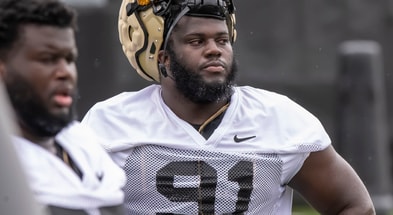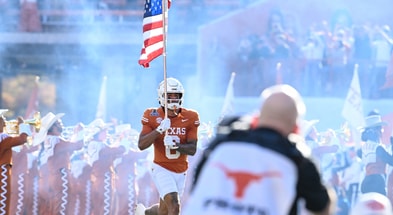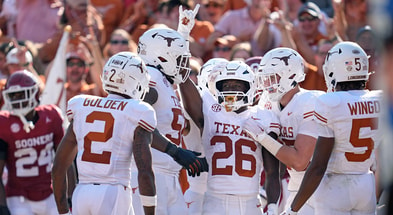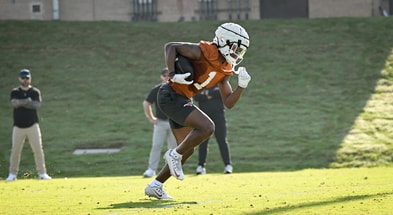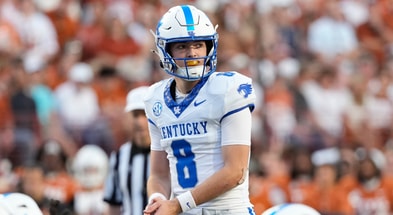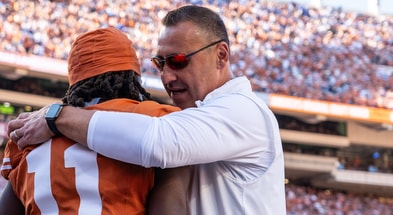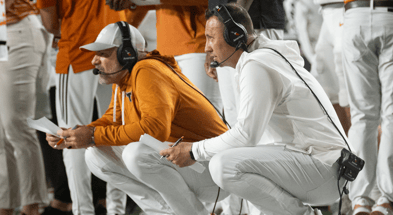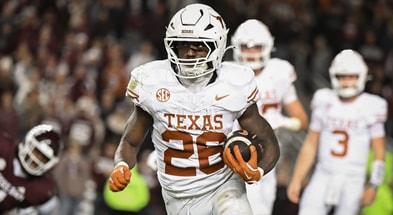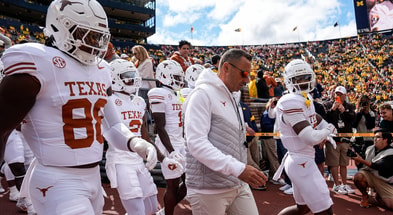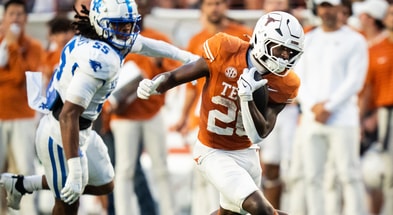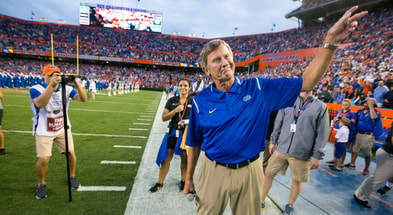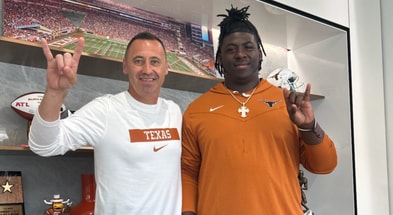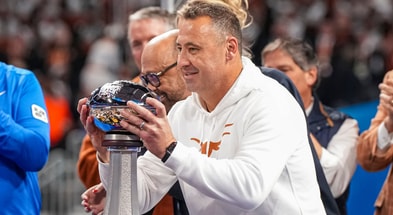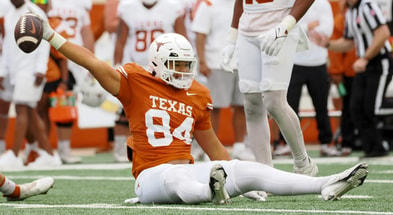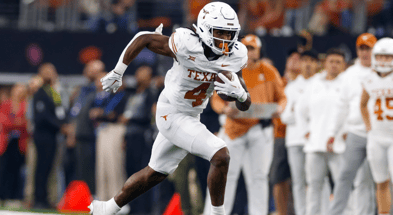Inside Steve Sarkisian's mind as a play-caller
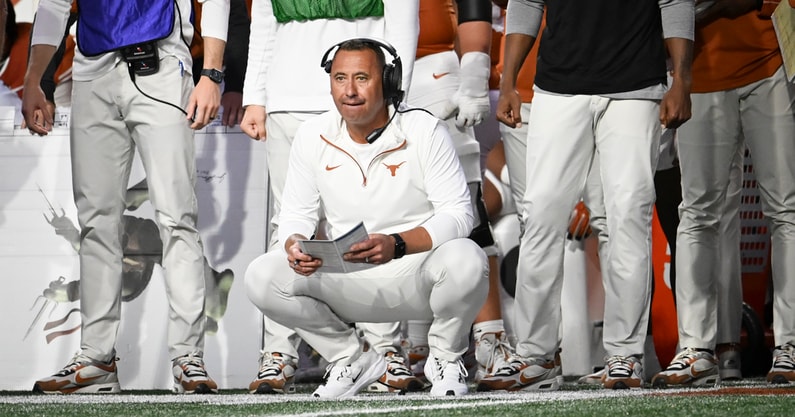
In his recent interview with “3rd and Longhorn,” Steve Sarkisian was asked to explain some of the influences that have molded him as an offensive play-caller. His answers revealed a lot about what the Longhorns are trying to do against opposing defenses.
[Sign up for Inside Texas TODAY and get the BEST Longhorns scoop!]
While his skills in that department have been a point of contention after the Longhorns’ red zone woes in 2023 and 2024, including with a National Championship at stake in the semi-final against Ohio State, no one across football disputes his prowess as an offensive coordinator.
Sark had a number of explanations for how he developed his particular system and approach to offensive football as well as what guides him in attacking defenses from week to week.
In terms of system, Sark pinpointed Andy Reid of the Kansas Chiefs in particular for his ability to build a versatile system from a specific foundation. Additionally, he noted Mike Shanahan and his son Kyle and the other current NFL coaches who came from that tree including Green Bay coach Matt Lefleur, Dolphins coach Mike McDaniel, and Rams coach Sean McVay. All of those guys worked together at Washington with Robert Griffin III before elder Shanahan retired and those younger coaches all began to take over the NFL.
A little known fact about Andy Reid was that he was a grad assistant at BYU in 1982, giving him some overlapping background with Sark who played there over a decade later under LaVell Edwards and Norm Chow. Amusingly enough, Mike Leach also drew his first influence from there, there’s little in modern football that doesn’t trace back to Edwards’ BYU program.
From the Shanahan school of coaches Sark took their emphasis on outside zone and the play-action you can create from that foundational running scheme. Texas was heavy into outside zone in 2024 and have shared some offensive concepts with both Reid and some of these Shanahan-tree guys such as “Ezekiel’s Wheel.“
However, Sark had some other fascinating details on how he approaches his job as a play-caller based on what he learned about defense from his bosses Pete Carroll and Nick Saban as well as Tampa 2 guru Monte Kiffin who visited USC often as he was a mentor to Carroll and also had a son on staff named Lane.
“The credit goes to Pete Carroll and Nick Saban, because they taught me defensive football,” Sark said. “By knowing defensive football, we don’t just run plays. We run plays to beat very specific things. And we’re running plays to know where you’re vulnerable and to know who’s taxed.”
This sort of probing approach is very subtle and hard to see watching live, but a particular run from a particular formation and how the defense reacts can tell you a lot about who’s being asked to do what and who might be in a real pickle if you were to run, say a play-action pass that looks like that run. Perhaps a particular defender is going to end up having to cover more ground than is realistic.
“A lot of times the average fan may say ‘why did they run that? That play is never gonna work.’ We’re not running that play for that play to work, we’re running that play for the next play to work or the play that I’m gonna run in the third quarter.”
Top 10
- 1New
Jim Harbaugh sued
Warde Manuel also named in lawsuit
- 2
Ty Simpson
'Coach Saban's not going to walk in'
- 3Hot
Top 25
EA Sports CFB 26 rankings
- 4
Nick Saban
His own harshest critic
- 5
Big 12 Conference
Ends preseason media poll
Get the On3 Top 10 to your inbox every morning
By clicking "Subscribe to Newsletter", I agree to On3's Privacy Notice, Terms, and use of my personal information described therein.
Sark will be the first guy to tell you how blessed he was to work with or near these three different defensive gurus with their knowledge of a few different styles of defense. Defenses are built around rules that tell defenders how to react quickly to what the offense is doing. Sark loves to design plays to either break rules for the defense or else to test whether each defender in the opposing scheme understands his job or can actually execute the more difficult assignments it can entail.
“I hate playing the defenses that don’t know what they’re doing,” Sark joked when detailing this approach. This amusing confession by Sark is actually quite revelatory of how he approaches play-calling and coaching.
Good offenses will tend to rip up defenses that are inconsistent and may not have a mastery of their own rules. But if you’re a guy who likes to script and control the flow of the game with precise play-calls like Sark does, it’s hard to do so when you can’t call plays to engender desired outcomes against a particular defense. You’re going to end up with a bunch of explosive plays and likely win the game, but you don’t necessarily know when and how they’ll come because defensive miscues will become a bigger driving force than offensive intention.
It may also be harder to steer the game to a conclusion and run clock once you’ve built a lead, although outside zone tends to be the ideal base running play for punishing “jack of all trade, master of none” defenses. Texas A&M and Clemson could tell you all about it.
Sark probably enjoys getting away from the Big 12 with some of it’s grab-bag defensive coaches who will throw anything and everything at the wall for a chance to beat the Longhorns. The SEC tends to be a little more focused on accumulating talent and playing with great fundamentals. Sark has a plan against the SEC and in 2025 we’ll see the next iteration of it.
[Order THE LONGHORN ALPHABET: Your little Longhorns can know about famous plays like Roll Left!]
Knowing the opponents and Sark’s background, it’s a good guess that it’ll somewhat resemble what you see from some of the top offensive coaches in the NFL.
